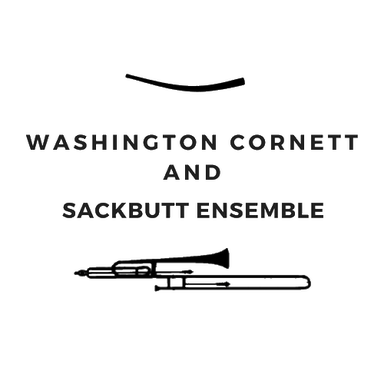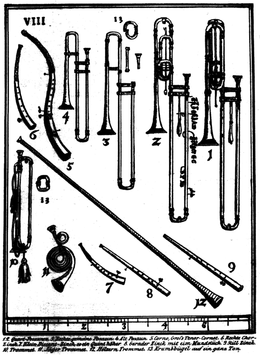Considered one of the premiere ensembles of its kind in North America, the Washington Cornett and Sackbutt Ensemble (WCSE), directed by Michael Holmes, consists of historic brass instrument specialists based in Washington D.C. Assemblages of cornetts (curved hybrid brass/woodwind instruments) and sackbuts (early trombones) comprised what was the standard brass ensemble of the late Renaissance and early Baroque eras of Western music.
WCSE’s membership has modified and grown considerably since its inception in 1997, performing extensively and in high demand in the Eastern U.S. with some of the more prominent historic vocal and instrumental groups in the American early music community. Its repertoire is vast, exploring nearly every possible style, period and region where early brass sources were represented, including music from the Italian, German, Polish, Bohemian, Moravian, Scandinavian, Spainish, and English courts, as well as the Americas. In the summer of 2001, WCSE produced its first recording of music by Giovanni Gabrieli and Heinrich Schütz. In August 2003, they were invited to be the featured ensemble at the Historic Brass Society Festival at Yale University (New Haven, CT). WCSE was also featured in the 2004 CD recording Mass in Honor of the Immaculate Conception in music by Monteverdi, Gabrieli, Frescobaldi, Marenzio, and Ugolini, in collaboration with the choir of the National Shrine of the Immaculate Conception in Washington D.C. Another one of their recordings of a canzona by Claudio Merulo circulated widely to numerous North American universities in 2005 as part of the anthology for Craig Wright and Brian Simms’s music history textbook Music in Western Civilization.
WCSE performed at the 2015 Boston Early Music Festival, and more recently was the featured ensemble for the Washington Bach Consort’s Christmas with the Consort in December 2016. The ensemble continues to provide their unique, mellifluous, and historically informed sound for numerous choirs who want to enrich their programming through the glorious forgotten practice of colla parte (“doubling the choral parts”) or providing Stadtpfeiffer (“town piper”) fanfares and flourishes for ceremonial occasions. WCSE has received much critical acclaim since its inception:
“…delivered with serious attention to detail.” - The Washington Post
“…a beautiful display of virtuosity.” - The Washington Post
“…tantalizingly close to reproducing Venetian-baroque surround sound” - Richmond Times-Dispatch
“A stylish and sonorous performance.” - Richmond Times-Dispatch
WCSE’s membership has modified and grown considerably since its inception in 1997, performing extensively and in high demand in the Eastern U.S. with some of the more prominent historic vocal and instrumental groups in the American early music community. Its repertoire is vast, exploring nearly every possible style, period and region where early brass sources were represented, including music from the Italian, German, Polish, Bohemian, Moravian, Scandinavian, Spainish, and English courts, as well as the Americas. In the summer of 2001, WCSE produced its first recording of music by Giovanni Gabrieli and Heinrich Schütz. In August 2003, they were invited to be the featured ensemble at the Historic Brass Society Festival at Yale University (New Haven, CT). WCSE was also featured in the 2004 CD recording Mass in Honor of the Immaculate Conception in music by Monteverdi, Gabrieli, Frescobaldi, Marenzio, and Ugolini, in collaboration with the choir of the National Shrine of the Immaculate Conception in Washington D.C. Another one of their recordings of a canzona by Claudio Merulo circulated widely to numerous North American universities in 2005 as part of the anthology for Craig Wright and Brian Simms’s music history textbook Music in Western Civilization.
WCSE performed at the 2015 Boston Early Music Festival, and more recently was the featured ensemble for the Washington Bach Consort’s Christmas with the Consort in December 2016. The ensemble continues to provide their unique, mellifluous, and historically informed sound for numerous choirs who want to enrich their programming through the glorious forgotten practice of colla parte (“doubling the choral parts”) or providing Stadtpfeiffer (“town piper”) fanfares and flourishes for ceremonial occasions. WCSE has received much critical acclaim since its inception:
“…delivered with serious attention to detail.” - The Washington Post
“…a beautiful display of virtuosity.” - The Washington Post
“…tantalizingly close to reproducing Venetian-baroque surround sound” - Richmond Times-Dispatch
“A stylish and sonorous performance.” - Richmond Times-Dispatch

